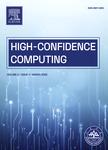Workload-based randomization byzantine fault tolerance consensus protocol
作者机构:School of Computer and Electronic InformationGuangxi UniversityNanningChina
出 版 物:《High-Confidence Computing》 (高置信计算(英文))
年 卷 期:2022年第2卷第3期
页 面:24-30页
核心收录:
学科分类:060302[历史学-世界古代中古史] 06[历史学] 0603[历史学-世界史]
基 金:supported by the National Natural Science Foundation of China(No.61962005) National Key Research and Development Program of China(No.2018YFB1404404)
主 题:Blockchain Consensus algorithm BFT PBFT Verifiable random function
摘 要:This paper introduces a new Byzantine fault tolerance protocol called workload-based randomization Byzantine fault tolerance protocol(WRBFT).Improvements are made to the Practical Byzantine Fault Tolerance(PBFT),which has an important position in the Byzantine Fault consensus *** PBFT has numerous ad-vantages,its primary node selection mechanism is overly fixed,the communication overhead of the consensus process is also high,and nodes cannot join and exit *** solve these problems,the WRBFT proposed in this paper combines node consensus workload and verifiable random function(VRF)to randomly select the more reliable primary node that dominates the *** selection of the nodes involved in the consensus is based on the node workload,and the optimization of the agreement protocol of the PBFT is also based on *** results show that the WRBFT has higher throughput,lower consensus latency,and higher algorithmic efficiency compared to the PBFT.



